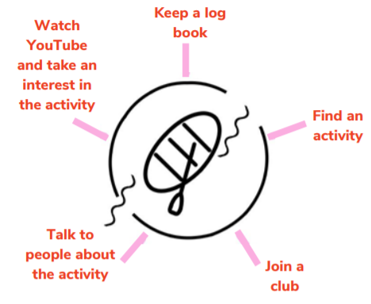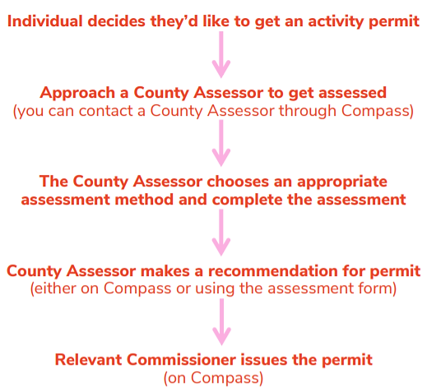Step 2 – Get Set
Step 2 – Get Set
The first step is to learn about how to use your knowledge and skills to lead the activity for others.
The best way to achieve this by attending a training course for your chosen activity. This might be delivered by an activity team in your area, or a Scout activity centre/campsite, or you may benefit from attending an external course.

If you hold a NGB qualification and have recent relevant experience in delivering activities, you should speak to an assessor who will be able to talk about how you can transfer your skills and experiences into a Scouting Permit. Each permit is aligned to a NGB qualification that can be checked in the relevant activities assessment checklist.
If you choose to attend a training course, you will then have some time to consolidate your leadership skills before being assessed for an activity permit. A good way to consolidate your skills is to practise leading your activity with the support of an experienced mentor who already has a supervisory activity permit. Once you feel confident in your ability to lead your activity, it’s time to think about your assessment.
You should fill in your details on the Adventurous Activity Permit Application form. Once you have completed your form, contact an assessor who will be able support you. You can do this either through the messaging function on Compass, or through your local contacts.
Your permit application will be handed to your Assessor and District Commissioner as you go through the assessment process.
The Assessment Process

To gain an activity permit you will be assessed in the following four areas.
The first part of the assessment process focuses on your technical skills, knowledge and experience relevant to the activity.
Your Assessor will use a variety of methods to build a picture of your skills and knowledge in your chosen activity.
To understand your experience they will consider the details you have recorded in your logbook. To assess your technical skills they are likely to carry out a practical assessment, which will involve observing you leading the activity. They may also ask you to consider what you would do in particular situations. If you have an NGB qualification, you may be able to present this in lieu of a practical assessment. Instead, you may be asked some questions or given some scenarios to help demonstrate your skills.
The assessment should be conducted in a way that supports you to demonstrate your skills at your best. It's not supposed to trick you or catch you out, and should be a positive experience for everyone involved.
The second part of the assessment focuses on your understanding of The Scout rules for the activity you wish to lead.
Your Commissioner, their nominated representative, or possibly the Assessor, will carry out this assessment, at the same time as assessing your technical competence.
The third part of the assessment focuses on ensuring that you have the required safeguarding training.
This will be carried out by your Commissioner.
The final part of the assessment focuses on your attitude and approach to leading the activity in accordance with the values of The Scouts.
This will be carried out by your Commissioner.
What Happens Next?
Providing your Assessor and Commissioner are confident in your ability to deliver your chosen activity, a permit will be granted by your Commissioner and uploaded on to Compass.
The Assessor may recommend a permit with restrictions or a Commissioner may grant a permit with restrictions. In both cases, these restrictions should reflect your abilities and encourage your future development. They can be used when you may be familiar using certain types of climbing equipment, confident leading water activities only at your local lake, or only currently suitable to lead a smaller group of members than a full permit allows. In all of these cases should you wish you should be able to develop your skills further in order to be reassessed to gain an unrestricted permit.
They could possibly consider you to be unsuitable to lead adventurous activities. Your Assessor should explain the reasons behind these restrictions and be able to support you to identify the next steps in your development. Many Counties have activity teams that can support you with your training and help you get to the point of getting a permit.